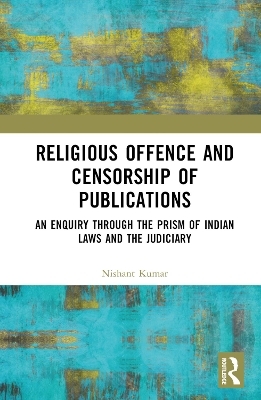
Religious Offence and Censorship of Publications
Routledge India (Verlag)
978-1-032-38499-3 (ISBN)
This book analyzes the role of laws and the judiciary in the process of censorship in India. It examines the rationales and observations produced by the judiciary when demands for censorship are directed against publications that allegedly offend religious sentiments. Focusing on a micro-level analysis of censorship of publications, it presents a hard case to understand the limitations of freedom of expression and the role played by the judiciary in defining its boundaries. The volume traces the evolution of laws governing freedom of expression since the colonial period and the context in which these laws were amended after Independence. It also explicates how the legal process – the structural and functional aspects of working of judiciary – affects the fate of freedom of expression in India. Employing comparative legal analysis, it tries to understand and situate the Indian case within the larger discourse of censorship and freedom of expression around the world, thereby marking its similarities and differences. In unravelling the politics of censorship, the author also examines the interaction among different stakeholders like government, non-state actors and the judiciary.
A tract for our times, this book will be of great interest to scholars and researchers of law, especially constitutional law and fundamental rights, politics, especially political theory and Indian politics, modern India and South Asian studies.
Nishant Kumar teaches Political Science at Dyal Singh College, University of Delhi, India. After finishing his undergraduate studies from Hindu College (DU) and postgraduate studies from the Centre from Political Studies (JNU), he completed his PhD from King’s College London, UK, as Commonwealth Scholar. His areas of interest include political theory, constitutional law in South Asia and intellectual history. He is currently also the coordinator of IHRG (Intellectual History Research Group), an international group of scholars working in the field of the history of ideas in India.
Acknowledgements
List of Abbreviations
List of Cases
Introduction
1 Censorship of Publications in Colonial India: The Genesis of a Legal Idea
2 Freedom of Expression and Religious Vilifications: Decoding the Constitutional and Legal Definition of ‘Limits’
3 Preventing Religious Offence: Law, Courts and Freedom of Expression
4 Law and Legal Process as Hurdles
5 Non-state Actors as Censors: The Legal Position
Conclusion
References
Index
| Erscheinungsdatum | 08.02.2023 |
|---|---|
| Zusatzinfo | 2 Tables, black and white |
| Verlagsort | London |
| Sprache | englisch |
| Maße | 156 x 234 mm |
| Gewicht | 521 g |
| Themenwelt | Geisteswissenschaften ► Religion / Theologie |
| Naturwissenschaften ► Geowissenschaften ► Geografie / Kartografie | |
| Recht / Steuern ► EU / Internationales Recht | |
| Recht / Steuern ► Öffentliches Recht ► Verfassungsrecht | |
| Sozialwissenschaften ► Politik / Verwaltung | |
| Sozialwissenschaften ► Soziologie ► Spezielle Soziologien | |
| ISBN-10 | 1-032-38499-9 / 1032384999 |
| ISBN-13 | 978-1-032-38499-3 / 9781032384993 |
| Zustand | Neuware |
| Haben Sie eine Frage zum Produkt? |
aus dem Bereich


